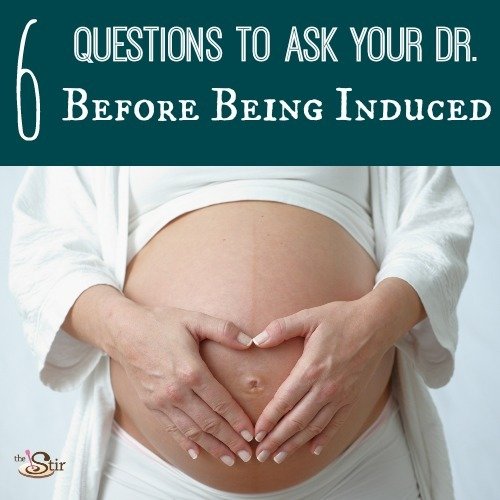So, you're pregnant and your doctor has suggested inducing labor? Welcome to the club. An estimated one in five pregnant women end up having their labor started artificially.
But just because your OB/GYN has suggested being induced doesn't mean it's right for you. Here are six questions to ask your physician before saying yes (or no!) to induced labor:

1. Why is inducing labor necessary? If you're uneasy about being induced, Dr. Akua Afriyie-Gray, an OB/GYN at Loyola University Health System and an assistant professor of OB/GYN at Loyola University Chicago Stritch School of Medicine, says it's important to find out what's on your doctor's mind. Although most OB/GYNs will not induce labor until very late in the pregnancy, there are a number of health reasons that may prompt a doctor to suggest baby needs to be delivered early, including gestational or chronic hypertension, preeclampsia, eclampsia, diabetes, premature rupture of membranes, and severe fetal growth restriction.
Then there's being pregnant too long (yes, it's a real thing).
"As the woman approaches 42 weeks of gestation, your provider will suggest induction because of increased fetal risks of stillbirth, difficulty delivering vaginally because of size (fetal macrosomia), difficulty for the placenta to nourish the fetus, and risk of meconium aspiration," says Dr. Afriyie-Gray.
"The most important thing for a mother to understand prior to induction is the reason it is recommended," she continues. "This allows the mom-to-be to work in partnership with her provider for the best outcome for her and for her baby."
2. When will it happen? The American Congress of Obstetricians and Gynecologists (ACOG) has some pretty clear rules on when OB/GYNs should and should not induce labor. Unless there is a medical reason for inducing labor, ACOG has ruled that the "gestational age of the fetus should be determined to be at least 39 weeks or that fetal lung maturity" has been established.
3. How will you induce? There are various ways used to induce labor, and it's probably no surprise that not all are right for every woman. For example, ACOG recommends against using misoprostol, a drug often used to soften the cervix, if you've had a previous C-section because it ups the possibility of uterine rupture.
Hope to keep this induction as natural as possible? That's possible.
Ask your doctor if they can hold off on using drugs. For some women, merely breaking the water is enough to induce labor, Dr. Afriyie-Gray says.
Membrane stripping, in which your doctor uses his hands to separate the bag of water from the cervix to soften it, is also an ACOG-approved means of trying to kick start contractions — although it is not successful for every mom.
4. Will you do an episiotomy? An episiotomy is an incision made in the perineum (that's tissue between your vaginal opening and your anus) that was once common practice during delivery. But according to Dr. Afriyie-Gray, use of episiotomy should be restricted. "Induction of labor does not directly result in use of episiotomy; however, causes for induction, such as a large infant, may result in its use," she explains.
5. Is it safe? Hopefully your OB/GYN is aware of your medical history and puts that all into perspective, but it's worth pointing out that ACOG considers induction to be contraindicated in the following cases: transverse fetal position, umbilical cord prolapse, active genital herpes infection, placenta previa, and women who have had a previous myomectomy (fibroid removal) from the inside of the uterus. If any of these exist, and your doctor is pushing for an induction, be your own advocate and speak up.
6. Can I say no? It's your body, and it should be your choice. But this goes back to question number one — is it going to be safe for you and your baby to say no?
"It is important to know that when used appropriately, induction can be life-saving," says Dr. Afriyie-Gray.
Has your doctor suggested induction? What have you decided to do?
Images via © iStock.com/Marilyn Nieves; iStock.com/FocusInClose




